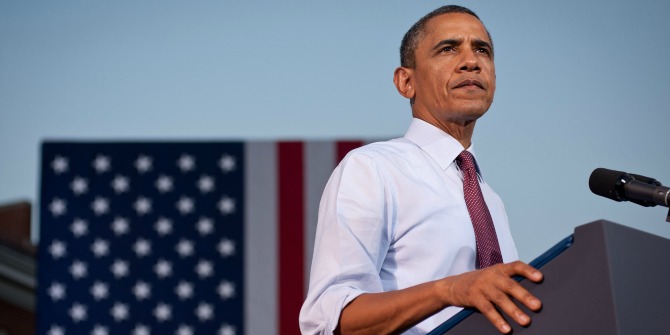In The End of American World Order, Amitav Acharya proposes that the world may never again see the US dominance which characterised the 20th and early 21st centuries. His proposed multiplex solution, a multi-screened cinema of global governance, offers a compelling vision of the post-American world, writes Lauren Young.
 The End of American World Order. Amitav Acharya. Polity. 2014.
The End of American World Order. Amitav Acharya. Polity. 2014.
From headlines about how Putin foiled Obama with the recent incursion into the Ukraine, to coverage of the ISIS insurgency in Iraq and claims of US military failure there, the sub text of the decline of American hegemony is topical in today’s changing policy landscape. Amitav Acharya’s The End of American Order tackles the shift in policy focus away from a central US-dominant position and proposes how global governance might be conducted afterwards.
At its best, the originality of Acharya’s work lies in its neutrality. It is neither anti-American nor US-focused. He argues that it is not necessary for America to be in terminal decline for the close of the era of American hegemony to be upon us. The centre of military, economic, and ideological gravity, mostly brought about by the rise of emerging nations and concomitant regional interests, has resulted in a natural shift away from a singularly dominant US position. Acharya’s central question is what lies beyond the liberal American hegemon and the forces that will characterize a future global order.
Acharya’s point of departure is the decline of the American-led liberal world order, sustained by the clearly defined bi-polarity of the Cold War Superpowers. From the outset of the work, Acharya states that “this is not a book about the decline of the US, but the decline of the American World Order ” (p. 1). While his argument is rooted in the inevitability of the policy focus shifting away from America, Acharya does well to situate his argument in the inevitability of the policy shift, rather than the popular debate about America’s secular decline. While arguments about the economic weakness inherent in aggressive US tax cuts, an untenable budget deficit, as well as the possible move away from the Dollar as a reserve currency are accounted for (p. 21), Acharya also cites Robert Kagan’s analysis that the US share of global GDP has remained more or less constant since the 1970s (p. 23), and other theoreticians who counter the anti-America argument with evidence such as the increase of US wealth, economic productivity, and continued superior military capability relative to emerging nations. While the author lays out both sides of the argument about American decline, he makes clear that any move away from the American-centric world is an inevitable response to a more complex and inter-dependent world than the European model essentially formulated as a response to the two World Wars and subsequent Cold War.
Acharya writes compellingly that the “Myths of Liberal Hegemony” exemplify the complexities of today’s world. At the turn of the 21st century, regional conflicts such as the Balkans, Iraq, Afghanistan, and East Timor have presented challengesto the liberal view that a uni-polar world was a safer one. (p. 17) However, a multi-polar world, comprised of several global powers, could also be argued to result in insecurity as “aggressors” would be less certain that the interests of their allies would be in line with their own. (p. 19). Acharya concedes that the equation of American hegemony with multi-lateralism has failed to adequately account for the rise of either Civil Society or non-state actors, both of which challenge the concept of the “state-centric conceptualization” and also tend to overlook the developing world, which Acharya argues is a key component to the new world order. (p. 54)

While the role of emerging powers such as the BRICS should be a central consideration, Acharya argues that they alone cannot step into the void created by the end of US world order. The rise of regional powers is an important characteristic of post-liberal US hegemon and one he argues which does not necessarily make global insecurity a forgone conclusion. One adaptation to bolster emerging powers has been the establishment of institutions such as the G-20 or IMF, intended to foster cooperation in global governance between emerging powers and established ones and ultimately formed to offset the weaknesses of rising powers inherent in their lack of coordinated agenda and resource constraints. The G-20, established in 1999 and representing 80% of the world population and 90% of the world GDP (p. 65), exemplifies one such potential cooperation in global governance. Acharya compares the “exclusivity” (p. 71) of the G-20 and IMF models of global governance with that of the Bandung Conference (1955) and its successor, the Non-Aligned Movement, in successfully integrating the South, concluding that “the G-20 is plagued with questions about its level of representation and legitimacy.” (p. 71). As a result, Acharya argues that these types of structures ultimately fail to adequately respond to the challenges that the emerging powers represent, as well as the inequities between rising nations and the West.
Acharya goes on to examine the proliferation of regional cooperation post-WW2. He argues that the US selectively supported regional cooperation, particularly in Europe through institutions such as NATO or the EU, when it coincided with its own political agenda, and opposed regional cooperation in Asia and Africa or selectively on issue-driven agendas such as regional trade agreements. Acharya also argues that Regionalism has also been less effective in the developing world which is resource-constrained. While he cites a variety of regional organizations, particularly with regard to transnational issues, as an important diversification of the global governance model away from the US and European dominated norms, he does not believe that the regional policy formula can sustain the post-liberal world order, precisely because of its inability to transcend the limits of its regional focus.
Acharya concludes that the concept of a “multiplex” world is the most likely evolution of the post-American World Order. This “concert” model “assumes that the great powers have a special responsibility in the management of international order” (p. 108). A multiplex world order, which Acharya likens to a cinema showing different films on each screen at the same time, provides a more equal opportunity for developing and established powers, and calls for greater attention to be paid to regional interests. It is “the political order of a culturally diverse world that rests on political and economic interconnectedness, as well as institutional arrangements, relying not on the power or purpose of a single actor or mechanism, but of a range of actors.” (p. 113)
Acharya proposes that the world may never again see the US dominance which characterised the 20th and early 21st centuries. His proposed multiplex solution, a multi-screened cinema of global governance, offers a compelling vision of the post-American world. With the potential scenarios which would replace it, from a Chinese dominated world order to a resuscitation of the previous American hegemon, Acharya contends that the key lies in the interdependence of global interests and the policies they must promote in order to achieve stability in the multiplex world.
This review originally appeared at the LSE Review of Books.
Please read our comments policy before commenting.
Note: This article gives the views of the authors, and not the position of USApp– American Politics and Policy, nor of the London School of Economics.
Shortened URL for this post: http://bit.ly/1AHAdPw
——————————————–
Lauren Young – LSE International History
Lauren Young currently teaches International History at the London School of Economics. Prior to that, she was a Fellow at the US Department of State working both at the UN Security Council and the US Embassy in London. Read more reviews by Lauren.






